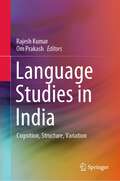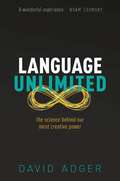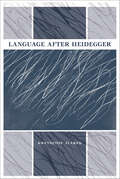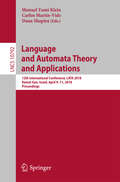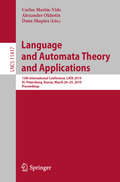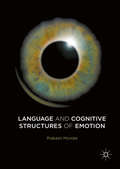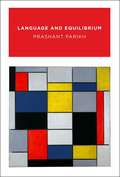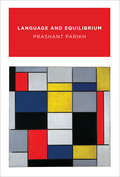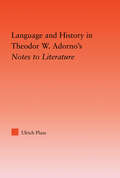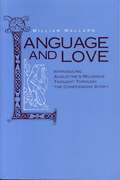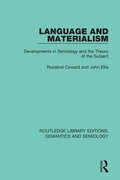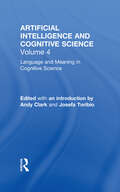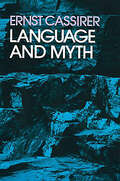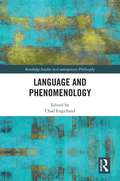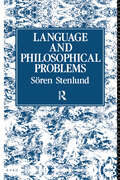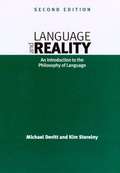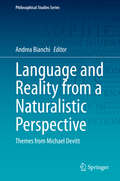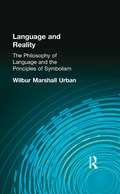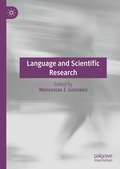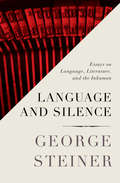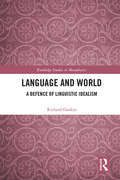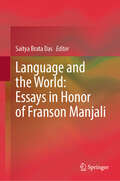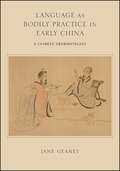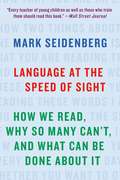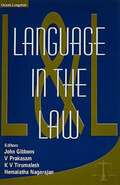- Table View
- List View
Language Studies in India: Cognition, Structure, Variation
by Rajesh Kumar Om PrakashThis book addresses a wide range of aspects of the study of language in a variety of domains such as cognition, change, acquisition, structure, philosophy, politics, and education. It offers a renewed discussion on normative understanding of these concepts and opens up avenues for a fresh look at these concepts. Each contribution in this book captures a wide range of perspectives and underlines the vigorous role of language, which happens to be central to the arguments contained therein. The uniqueness of this book lies in the fact that it presents simplified perspective on various complex aspects of language. It addresses a wide range of audiences, who do not necessarily need to have a technical background in linguistics. It focuses on complex relations between language and cognition, politics, education to name a few with reference to cognition, change, and acquisition. This book is for researchers with an interest in the field of language studies, applied linguistics, and socio-linguistics.
Language Unlimited: The Science Behind Our Most Creative Power
by David AdgerAll humans, but no other species, have the capacity to create and understand language. It provides structure to our thoughts, allowing us to plan, communicate, and create new ideas, without limit. Yet we have only finite experiences, and our languages have finite stores of words. Where does our linguistic creativity come from? How does the endless scope of language emerge from our limited selves? Drawing on research from neuroscience, psychology, and linguistics, David Adger takes the reader on a journey to the hidden structure behind all we say (or sign) and understand. Along the way you'll meet children who created language out of almost nothing, and find out how new languages emerge using structures found in languages spoken continents away. David Adger will show you how the more than 7000 languages in the world appear to obey the same deep scientific laws, how to invent a language that breaks these, and how our brains go crazy when we try to learn languages that just aren't possible. You'll discover why rats are better than we are at picking up certain language patterns, why apes are far worse at others, and how artificial intelligences, such as those behind Alexa and Siri, understand language in a very un-human way. This book explores the many mysteries about our capacity for language and reveals the source of its endless creativity.
Language after Heidegger (Studies in Continental Thought)
by Krzysztof ZiarekWorking from newly available texts in Heidegger's Complete Works, Krzysztof Ziarek presents Heidegger at his most radical and demonstrates how the thinker's daring use of language is an integral part of his philosophical expression. Ziarek emphasizes the liberating potential of language as an event that discloses being and amplifies Heidegger's call for a transformative approach to poetry, power, and ultimately, philosophy.
Language and Automata Theory and Applications: 12th International Conference, Lata 2018, Ramat Gan, Israel, April 9-11, 2018, Proceedings (Lecture Notes in Computer Science #10792)
by Shmuel Tomi Klein Carlos Martín-Vide Dana ShapiraThis book constitutes the refereed proceedings of the 12th International Conference on Language and Automata Theory and Applications, LATA 2018, held in Ramat Gan, Israel, in April 2018.The 20 revised full papers presented together with 3 invited papers were carefully reviewed and selected from 58 submissions. The papers cover fields like algebraic language theory, algorithms for semi-structured data mining, algorithms on automata and words, automata and logic, automata for system analysis and programme verification, automata networks, automatic structures, codes, combinatorics on words, computational complexity, concurrency and Petri nets, data and image compression, descriptional complexity, foundations of finite state technology, foundations of XML, grammars (Chomsky hierarchy, contextual, unification, categorial, etc.), grammatical inference and algorithmic learning, graphs and graph transformation, language varieties and semigroups, language-based cryptography, mathematical and logical foundations of programming methodologies, parallel and regulated rewriting, parsing, patterns, power series, string processing algorithms, symbolic dynamics, term rewriting, transducers, trees, tree languages and tree automata, and weighted automata.
Language and Automata Theory and Applications: 13th International Conference, LATA 2019, St. Petersburg, Russia, March 26-29, 2019, Proceedings (Lecture Notes in Computer Science #11417)
by Carlos Martín-Vide Alexander Okhotin Dana ShapiraThis book constitutes the refereed proceedings of the 13th International Conference on Language and Automata Theory and Applications, LATA 2019, held in St. Petersburg, Russia, in March 2019. The 31 revised full papers presented together with 5 invited talks were carefully reviewed and selected from 98 submissions. The papers cover the following topics: Automata; Complexity; Grammars; Languages; Graphs, trees and rewriting; and Words and codes.
Language and Cognitive Structures of Emotion
by Prakash MondalThis book examines linguistic expressions of emotion in intensional contexts and offers a formally elegant account of the relationship between language and emotion. The author presents a compelling case for the view that there exist, contrary to popular belief, logical universals at the intersection of language and emotive content. This book shows that emotive structures in the mind that are widely assumed to be not only subjectively or socio-culturally variable but also irrelevant to a general theory of cognition offer an unusually suitable ground for a formal theory of emotive representations, allowing for surprising logical and cognitive consequences for a theory of cognition. Challenging mainstream assumptions in cognitive science and in linguistics, this book will appeal to linguists, philosophers of the mind, linguistic anthropologists, psychologists and cognitive scientists of all persuasions.
Language and Equilibrium
by Prashant ParikhIn Language and Equilibrium, Prashant Parikh offers a new account of meaning for natural language. He argues that equilibrium, or balance among multiple interacting forces, is a key attribute of language and meaning and shows how to derive the meaning of an utterance from first principles by modeling it as a system of interdependent games. His account results in a novel view of semantics and pragmatics and describes how both may be integrated with syntax. It considers many aspects of meaning--including literal meaning and implicature--and advances a detailed theory of definite descriptions as an application of the framework. Language and Equilibrium is intended for a wide readership in the cognitive sciences, including philosophers, linguists, and artificial intelligence researchers as well as neuroscientists, psychologists, and economists interested in language and communication.
Language and Equilibrium
by Prashant ParikhA new framework that shows how to derive the meaning of an utterance from first principles by modeling it as a system of interdependent games. In Language and Equilibrium, Prashant Parikh offers a new account of meaning for natural language. He argues that equilibrium, or balance among multiple interacting forces, is a key attribute of language and meaning and shows how to derive the meaning of an utterance from first principles by modeling it as a system of interdependent games.His account results in a novel view of semantics and pragmatics and describes how both may be integrated with syntax. It considers many aspects of meaning—including literal meaning and implicature—and advances a detailed theory of definite descriptions as an application of the framework. Language and Equilibrium is intended for a wide readership in the cognitive sciences, including philosophers, linguists, and artificial intelligence researchers as well as neuroscientists, psychologists, and economists interested in language and communication.
Language and History in Adorno's Notes to Literature (Studies In Philosophy Ser.)
by Ulrich PlassLanguage and History in Theodor W. Adorno's Notes to Literature explores Adorno’s essays on literature as an independent contribution to his aesthetics with an emphasis on his theory and practice of literary interpretation. Essential to Adorno’s essays is his unorthodox treatment of language and history and his elaboration of the links between the two. One of Adorno’s major but often-neglected claims is that truth is relative to its historical medium, language. Adorno persistently and creatively tries to narrow the gulf between truth and expression, philosophy and rhetoric, and his essays on literature are practical examples of his effort to critically rescue the rhetorical dimension of philosophy. Rather than relying exclusively on aesthetic concepts inherited from his predecessors in the Western tradition (Kant, Hegel, Nietzsche, Kierkegaard), Adorno’s essays seek to transgress and transcend the conceptual limitations of aesthetic discourse by appropriating a non-conceptual, metaphorical vocabulary borrowed from the literary texts he investigates. Thus, Adorno’s interpretations of literature mobilize an alternative subterranean, primarily essayistic and fragmentary discourse on language and history that eludes the categories that tend to predominate his thinking in his major work, Aesthetic Theory. This book puts forth the claim that Adorno’s essays on literature are of central relevance for an understanding of his aesthetics because they challenge the conceptual limitations of philosophical discourse.
Language and Love: Introducing Augustine's Religious Thought Through the Confessions Story (G - Reference, Information and Interdisciplinary Subjects)
by William MallardThis is the first work to combine an introduction to Augustine's Confessions with a larger outline of his mature theology. Mallard provides guidance for reading the narrative Confessions (Books I–IX) and at the same time, by certain extensions and comments, reveals the three major topical divisions within Augustine's thought: creation, salvation, and the City of God. Mallard is able to do this because Augustine's affirmation of the good of Creation, his view of the human will and God's grace (and the nature of evil), his sense of a religious people's identity and their hope, and his view of faith and reason were all essentially in place at the time of the Confessions.Mallard argues that Augustine was not "in search of himself" in a modern sense but in search of a language of prayer, praise, and truth that would locate him within God's grace. That language turned out to be the language of Incarnation, which remains compelling and inviting today. As a classic work, the Confessions is a monument to its own time, but it has striking resonances for our own. Mallard's interpretation will challenge readers to begin working out their own. The Confessions endures because it is a story that illumines the stories of many, even to the present day. To analyze how it is like, and unlike, modern experiences is to exercise both mind and heart. In that respect, Language and Love is a kind of theological meditation on the Confessions testing out a horizon of belief. Mallard views Augustine as a master of the spoken word in an age of broken and abused language and the Confessions as a historic masterpiece of rhetoric. He contends that Augustine is the ancestor of many today who offer social and political hope through fresh rhetorical vitality.
Language and Materialism: Developments in Semiology and the Theory of the Subject (Routledge Library Editions: Semantics and Semiology #5)
by John Ellis Rosalind CowardFirst published in 1977, this book presents a comprehensive and lucid guide through the labyrinths of semiology and structuralism — perhaps the most significant systems of study to have been developed in the twentieth century. The authors describe the early presuppositions of structuralism and semiology which claim to be a materialist theory of language based on Saussure’s notion of the sign. They show how these presuppositions have been challenged by work following Althusser’s development of the Marxist theory of ideology, and by Lacan’s re-reading of Freud. The book explains how the encounter of two disciplines — psychoanalysis and Marxism — on the ground of their common problem —language — has produced a new understanding of society and its subjects. It produces a critical re-examination of the traditional Marxist theory of ideology, together with the concepts of sign and identity of the subject.
Language and Meaning in Cognitive Science: Cognitive Issues and Semantic theory (Artificial Intelligence And Cognitive Science Ser.)
by Andy Clark Josefa ToribioSummarizes and illuminates two decades of researchGathering important papers by both philosophers and scientists, this collection illuminates the central themes that have arisen during the last two decades of work on the conceptual foundations of artificial intelligence and cognitive science. Each volume begins with a comprehensive introduction that places the coverage in a broader perspective and links it with material in the companion volumes. The collection is of interest in many disciplines including computer science, linguistics, biology, information science, psychology, neuroscience, iconography, and philosophy. Examines initial efforts and the latest controversiesThe topics covered range from the bedrock assumptions of the computational approach to understanding the mind, to the more recent debates concerning cognitive architectures, all the way to the latest developments in robotics, artificial life, and dynamical systems theory. The collection first examines the lineage of major research programs, beginning with the basic idea of machine intelligence itself, then focuses on specific aspects of thought and intelligence, highlighting the much-discussed issue of consciousness, the equally important, but less densely researched issue of emotional response, and the more traditionally philosophical topic of language and meaning. Provides a gamut of perspectives The editors have included several articles that challenge crucial elements of the familiar research program of cognitive science, as well as important writings whose previous circulation has been limited. Within each volume the papers are organized to reflect a variety of research programs and issues. The substantive introductions that accompany each volume further organize the material and provide readers with a working sense of the issues and the connection between articles.
Language and Myth
by Ernst CassirerIn this important study Ernst Cassirer analyzes the non-rational thought processes that go to make up culture. He demonstrates that beneath both language and myth there lies an unconscious "grammar" of experience, whose categories and canons are not those of logical thought. He shows that this prelogical "logic" is not merely an undeveloped state of rationality, but something basically different, and that this archaic mode of thought still has enormous power over even our most rigorous thought, in language, poetry and myth.The author analyzes brilliantly such seemingly diverse (yet related) phenomena as the metaphysics of the Bhagavat Gita, the Melanesian concept of Mana, the Naturphilosophie of Schelling, modern poetry, Ancient Egyptian religion, and symbolic logic. He covers a vast range of material that is all too often neglected in studies of human thought.These six essays are of great interest to the student of philosophy or the philosophy of science, the historian, or the anthropologist. They are also remarkably timely for students of literature, what with the enormous emphasis placed upon "myth" in modern literary speculation. This book is not superficial speculation by a dabbler, but a penetrating study by one of the most profound and sensitive philosophic minds of our time.
Language and Phenomenology (Routledge Studies in Contemporary Philosophy)
by Chad EngellandAt first blush, phenomenology seems to be concerned preeminently with questions of knowledge, truth, and perception, and yet closer inspection reveals that the analyses of these phenomena remain bound up with language and that consequently phenomenology is, inextricably, a philosophy of language. Drawing on the insights of a variety of phenomenological authors, including Husserl, Heidegger, Merleau-Ponty, Gadamer, and Ricoeur, this collection of essays by leading scholars articulates the distinctively phenomenological contribution to language by examining two sets of questions. The first set of questions concerns the relatedness of language to experience. Studies exhibit the first-person character of the philosophy of language by focusing on lived experience, the issue of reference, and disclosive speech. The second set of questions concerns the relatedness of language to intersubjective experience. Studies exhibit the second-person character of the philosophy of language by focusing on language acquisition, culture, and conversation. This book will be of interest to scholars of phenomenology and philosophy of language.
Language and Philosophical Problems
by Sören StenlundLanguage and Philosophical Problems investigates problems about mind, meaning and mathematics rooted in preconceptions of language. It deals in particular with problems which are connected with our tendency to be misled by certain prevailing views and preconceptions about language. Philosophical claims made by theorists of meaning are scrutinized and shown to be connected with common views about the nature of certain mathematical notions and methods. Drawing in particular on Wittgenstein's ideas, Sren Stenlund demonstrates a strategy for tracing out and resolving conceptual and philosophical problems. By a critical examination of examples from different areas of philosophy, he shows that many problems arise through the transgression of the limits of the use of technical concepts and formal methods. Many prima facie different kinds of problems are shown to have common roots, and should thus be dealt and resolved together. Such an approach is usually prevented by the influence of traditional philosophical terminology and classification. The results of this investigation make it clear that the received ways of subdividing the subject matter of philosophy often conceal the roots of the problem.
Language and Reality
by Michael Devitt Kim SterelnyOur philosophical approach remains realist and naturalist and that approach permeates the work.
Language and Reality from a Naturalistic Perspective: Themes from Michael Devitt (Philosophical Studies Series #142)
by Andrea BianchiThis book celebrates the many important contributions to philosophy by one of the leading philosophers in the analytic field, Michael Devitt.It collects seventeen original essays by renowned philosophers from all over the world. They all develop themes from Devitt’s work, thus discussing many fundamental issues in philosophy of linguistics, theory of reference, theory of meaning, methodology, and metaphysics.In a long final chapter, Devitt himself replies to the contributors. In so doing, he further elaborates his views on various of these issues, for example defending his claim (in opposition to Chomskyan orthodoxy) that languages are external rather than internal; his well-known causal theory of reference; his “shocking” idea that meanings can be causal, non-descriptive, modes of presentation; his methodological naturalism; his commitment to scientific realism; and his version of biological essentialism. The volume will appeal to all scholars and students interested in contemporary theoretical analytic philosophy, and will be a must-read for any serious researcher in philosophy of language. It provides a deep insight into the work of one of the most important living philosophers, and will help readers to better understand language and reality from a naturalistic perspective.
Language and Reality: The Philosophy of Language and the Principles of Symbolism
by Wilbur Marshall UrbanFirst published in 2002. Routledge is an imprint of Taylor & Francis, an informa company.
Language and Scientific Research
by Wenceslao J. GonzalezThis book analyzes the role of language in scientific research and develops the semantics of science from different angles. The philosophical investigation of the volume is divided into four parts, which covers both basic science and applied science: I) The Problem of Reference and Potentialities of the Language in Science; II) Language and Change in Scientific Research: Evolution and Historicity; III) Scientific Language in the Context of Truth and Fiction; and IV) Language in Mathematics and in Empirical Sciences. Language plays a key role in science: our access to the theoretical, practical or evaluative dimensions of scientific activity begins with the mastery of language, continues with a deepening in the use of language and reaches the level of contribution when it creates new terms or changes them in sense and reference. This reveals the compatibility between objectivity in semantic contents and historicity in the progress of science. This volume is a valuable enrichment to students, academics and other professionals interested in science in all its forms, who seek to deepen the role that language plays in its structure and dynamics.
Language and Silence: Essays on Language, Literature, and the Inhuman (Peregrines Ser.)
by George SteinerThe evolution and manipulation of language from the celebrated author of After Babel. &“A keenly discriminating literary mind at work on what it loves&” (The New York Times Book Review).Language and Silence is a book about language—and politics, meaning, silence, and the future of literature. Originally published between 1958 and 1966, the essays that make up this collection ponder whether we have passed out of an era of verbal primacy and into one of post-linguistic forms—or partial silence. Steiner explores the idea of the abandonment of contemporary literary criticism, from the classics to the works of William Shakespeare, Lawrence Durell, Thomas Mann, Leon Trotsky, and more.
Language and World: A Defence of Linguistic Idealism (Routledge Studies in Metaphysics)
by Richard GaskinThis book defends a version of linguistic idealism, the thesis that the world is a product of language. In the course of defending this radical thesis, Gaskin addresses a wide range of topics in contemporary metaphysics, philosophy of language, philosophical logic, and syntax theory. Starting from the context and compositionality principles, and the idea of a systematic theory of meaning in the Tarski–Davidson tradition, Gaskin argues that the sentence is the primary unit of linguistic meaning, and that the main aspects of meaning, sense and reference, are themselves theoretical posits. Ontology, which is correlative with reference, emerges as language-driven. This linguistic idealism is combined with a realism that accepts the objectivity of science, and it is accordingly distinguished from empirical pragmatism. Gaskin contends that there is a basic metaphysical level at which everything is expressible in language; but the vindication of linguistic idealism is nuanced inasmuch as there is also a derived level, asymmetrically dependant on the basic level, at which reality can break free of language and reach into the realms of the unnameable and indescribable. Language and World will be of interest to scholars and advanced students working in metaphysics, philosophy of language, and linguistics.
Language and the World: Essays in Honor of Franson Manjali
by Saitya Brata DasThis book is a comprehensive and sustained engagement with the problematic of language. It addresses some of the most urgent questions of our contemporary times, such as Time and history, Violence and force, Law and justice, Ethics and politics, Metaphysics and technology, and Community and religion. It explores how language fosters the possibility of being with each other in non-totalizing ways. It presents a truly interdisciplinary approach, bringing together philosophers, social scientists, literary critics, and poets to offer fresh perspectives on the complexities of language. With contributions from scholars and thinkers worldwide, the scholarly volume is suitable for academics and researchers in the fields of linguistics, social sciences, philosophy, and contemporary culture studies.
Language as Bodily Practice in Early China: A Chinese Grammatology (SUNY series in Chinese Philosophy and Culture)
by Jane GeaneyJane Geaney argues that early Chinese conceptions of speech and naming cannot be properly understood if viewed through the dominant Western philosophical tradition in which language is framed through dualisms that are based on hierarchies of speech and writing, such as reality/appearance and one/many. Instead, early Chinese texts repeatedly create pairings of sounds and various visible things. This aural/visual polarity suggests that texts from early China treat speech as a bodily practice that is not detachable from its use in everyday experience. Firmly grounded in ideas about bodies from the early texts themselves, Geaney's interpretation offers new insights into three key themes in these texts: the notion of speakers' intentions (yi), the physical process of emulating exemplary people, and Confucius's proposal to rectify names (zhengming).
Language at the Speed of Sight: How We Read, Why So Many Can't, And What Can Be Done About It
by Mark SeidenbergAccording to a leading cognitive scientist, we've been teaching reading wrong. The latest science reveals how we can do it right. <p><p>In 2011, when an international survey reported that students in Shanghai dramatically outperformed American students in reading, math, and science, President Obama declared it a "Sputnik moment": a wake-up call about the dismal state of American education. Little has changed, however, since then: over half of our children still read at a basic level and few become highly proficient. <p><p> Many American children and adults are not functionally literate, with serious consequences. Poor readers are more likely to drop out of the educational system and as adults are unable to fully participate in the workforce, adequately manage their own health care, or advance their children's education. <p><p>In Language at the Speed of Sight, internationally renowned cognitive scientist Mark Seidenberg reveals the underexplored science of reading, which spans cognitive science, neurobiology, and linguistics. As Seidenberg shows, the disconnect between science and education is a major factor in America's chronic underachievement. <p><p>How we teach reading places many children at risk of failure, discriminates against poorer kids, and discourages even those who could have become more successful readers. Children aren't taught basic print skills because educators cling to the disproved theory that good readers guess the words in texts, a strategy that encourages skimming instead of close reading. <p><p>Interventions for children with reading disabilities are delayed because parents are mistakenly told their kids will catch up if they work harder. Learning to read is more difficult for children who speak a minority dialect in the home, but that is not reflected in classroom practices. By building on science's insights, we can improve how our children read, and take real steps toward solving the inequality that illiteracy breeds. <p><p>Both an expert look at our relationship with the written word and a rousing call to action, Language at the Speed of Sight is essential for parents, educators, policy makers, and all others who want to understand why so many fail to read, and how to change that.
Language in the Law
by John Carey V. Prakasam John Gibbons K. V. TirumaleshThe Language in the Law records the different modes and practices in the use of language related to law. The nexus between language and the law in various countries and cultures is examined in this book.
